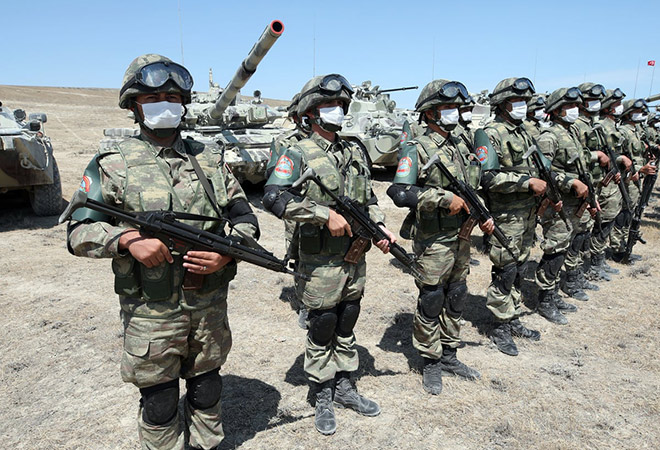Por que a Turquia contratou sírios para lutar pelo Azerbaijão
As recentes hostilidades entre o Azerbaijão e a Armênia sobre sua região contestada de Nagorno-Karabkh tornaram-se um evento internacional, com a Turquia colocando seu peso atrás de Baku como Yerevan tacitamente manteve seu entendimento com a Rússia, que garante sua segurança através da Organização do Tratado de Segurança Coletiva (CSTO). No entanto, a natureza da geopolítica, especificamente no Oriente Médio, aparentemente se afetou na Ásia Central, bem como com combatentes estrangeiros, supostamente "contratados" pela Turquia através de empreiteiros privados para trabalhar como "guardas de fronteira" que chegam ao Azerbaijão para adicionar uma linha de fundo significativa para os militares azeri.
Em primeiro lugar, a crise nagorno-karabakh é um estudo muito interessante nos movimentos modernos da própria geopolítica, que é importante entender por que alguns Estados gastariam dinheiro para armar outros estados, sem tentar se envolver diretamente através de seus militares soberanos. Na divisão azeri – armênio, os azeris, que são mais de 80% xiitas, estão sendo apoiados pela Turquia, um estado sunita-islâmico, enquanto o Irã é acusado também de apoiara Armênia , uma nação cristã majoritária, enquanto é a sede do poder xiita. Este teatro em curso oferece um vislumbre interessante sobre o papel dos objetivos estratégicos e táticos em relação aos interesses, este último tendo uma ressonância muito mais forte na política externa, especificamente quando visto de uma perspectiva de longo prazo.
A proteção de "interesses" que podem ser difíceis de definir em torno das ideações de um Estado-nação moderno muitas vezes força os governos a recorrer a uma guerra paralela, ou "proxy", não se envolver diretamente em confrontos militares, mas lutando uma luta geopolítica indiretamente, às vezes em solo de terceiros. No entanto, desde 1964, quando o notável cientista político Karl Deutsch definiu a guerra por procuração como "um conflito internacional entre duas potências estrangeiras, travada no solo de um país terceiro; disfarçado como um conflito sobre a questão interna daquele país; e usando parte da mão-de-obra daquele país, os recursos como forma de alcançar metas preponderantemente estrangeiras e estratégias estrangeiras, as coisas mudaram drasticamente. Enquanto a natureza do conflito mudou na era pós-Segunda Guerra Mundial, as forças armadas administradas pelo Estado permaneceram como as proeminentes forças de combate. Isso diluíu-se ainda mais à medida que a geopolítica e a guerra mudaram na era pós-soviética dos anos 1990, com a globalização desenfreada, os avanços tecnológicos e assim por diante adicionando camadas e desafios mais novos. Isso foi talvez mais exibido publicamente pelas múltiplas controvérsias em meados dos anos 2000 em torno da empresa de segurança Blackwater, dirigida pelo empresário americano e ex-seal da Marinha dos EUA Erik Prince, que privatizou muitas partes da guerra dos EUA no Iraque após o 11 de setembro, mostrando abertamente talvez pela primeira vez a forma mais grosseira de lucro aceitável do mercado de um conflito (Prince ainda está ativo, agora tentando trabalhar com a China).
Scholar Peter W. Singer adds to this thinking, highlighting three dynamics that led to the rise of a ‘private military industry’, the end of the Cold War, transformation of warfare blurring lines between soldiers and civilians and general trends towards privatization and outsourcing of government functions. Singer explains in his research how these changes rose within the American military establishments. However, a lot of these ideologies of warfare were also internalised by various other states in environments more fertile in conflict, such as the Middle East.
The Syrian civil war, raging as an endless spiral since late 2010, has seen the above-mentioned strategies playout in various formats. From the so-called Islamic State’s (ISIS) official rise in 2014, relying on incoming foreign fighters for technological and combat expertise and leadership, to Iran’s Fatemiyoun Brigade which comprises of young Afghan men who saw combat in places such as Aleppo, Hama, Deir Ezzor, Homs and so on in Syria against ISIS and other factions. This allowed Iran’s infamous Islamic Revolutionary Guard Corps (IRGC) to keep Iranian casualties in the Syrian war low, while the country went through economic crisis due to sanctions and a probing population over the money being spent on wars beyond its borders. It does not all end only in Syria, in Libya, in northern Africa, Russia deployed mercenaries of the Wagner Group to support the renegade general Khalifa Haftar’s battle against the government in Tripoli. In response, once again, an overreaching Turkey is accused of sending fighters from Syria to help prop-up the Libyan government against Haftar, who is backed by Russia and the UAE.
Fighters from Syria are an amalgamation of circumstances and ground realities. Many who are finding their way into other conflict theatres such as Libya or now Azerbaijan don’t necessarily come from same backgrounds of militants, militias, Islamists and so on. While the ones fighting on Turkey’s behalf in Libya most likely are hardened militias who see Turkish President Recep Erdogan’s self-styled Sunni-power leader image as palatable, and do so in support of Ankara’s regional geopolitical manoeuvres, the ones in Azerbaijan, reportedly hired by private contractors, are those who suffer from economic destitution back home, and see this as merely a job that pays. The videos and images posted on social media of Syrian fighters killed in Nagorno-Karabakh have been traced back in some cases to men belonging to normal families without any history of being aligned with terror groups. However, the lure of a good pay day to fight for a second country on a third country’s land, perhaps has been far too inviting to ignore for many Syrians. In theory, this is the same model employed by the Fatemiyoun Brigade, with Afghan men taken to Iran, and then flown to Syria to fight for Tehran. This model has over the past few years become more visible, and viable for states such as Russia, Iran and Turkey.
For Turkey, emboldened by a leadership such as that of Erdogan who has managed to create problems on almost all sides of the Turkish borders with an expanding military reach ranging from Libya to the Mediterranean Sea, with friction with the likes of Greece, and by association the European Union, the US despite being a NATO ally and active military presence and geographic hold in northern Syria, ‘outsourcing’ conflicts becomes an economically viable option. During the internal GCC feud between Saudi Arabia, UAE and Qatar, Erdogan deployed military assets to Doha, signal further entrenchment of Turkish military as part of its foreign policy. However, ultimately, all of this is bogged down by the limitations of a relatively timid Turkish economy, specifically during the Covid-19 era.
Another country where these kinds of ‘contract’ private entities could be deployed in the near future is Afghanistan, as the US hurries its withdrawal, leaving behind significant security vacuums. The private sector has not shied away from filling in such gaps in the past, and these private sector capabilities go much beyond just security guards on the borders. Iraq remains a prime example of the same, with companies that have nothing to do with the defence industry also seeing an opportunity to make a buck. For example, the American energy company Halliburton also won multiple contracts by the British and American military to transport troops to Afghanistan, amongst other operations in the mid-2000s despite defence not being its primary business in public discourse.
Unresolved crisis points such as Syria, Yemen, Iraq, and proxy conflicts enabled by the likes of Iran and the Gulf states are creating a micro-economy of fighters that are able and willing to fight in return for economic benefits. This largely comes from years of economic collapse of entire states, and not necessarily from Islamist terror groups and radicalisation. However, like private contractors, Islamist groups also employ similar tactics to retain a fighting force.
The international community should pay adequate attention to these trends of unchecked private militias for hire, that are deployed with much ease today to regional theatres, such as Nagorno-Karabkh today. The fact that Turkey was able to ‘hire’ and airlift third party fighters and only provide them air cover via a minimal deployment has a strong two-front tactical and strategic success at play, the first being purely military, and the second and perhaps more importantly being not inciting domestic politics against a leadership by starting conflicts in foreign lands and deploying own troops with the eventuality of casualties. Turkey’s overtures in Nagorno-Karabkh got support from the likes of Pakistan as well, where social media handles praised and supported Erdogan’s moves in favour of Baku. Islamabad’s own experiences and support for proxy warfare is well known world over.
International multilateral institutions should take these trends of outward-going foreign fighters from Syria as events that need urgent attention and develop international laws to check countries looking to exploit conditions of civil war even further for their strategic benefit. Like there are institutions against nuclear proliferation, chemical weapons and so on, such use of foreign citizens as war-time products should have an equitable global response both for safeguard of localised regional communities in conflict and the global security architecture at the same time.
The views expressed above belong to the author(s).ORF research and analyses now available on Telegram! Click here to access our curated content — blogs, longforms and interviews.



Comentários